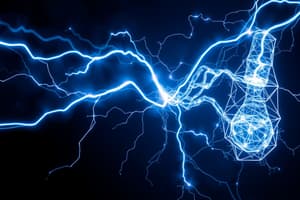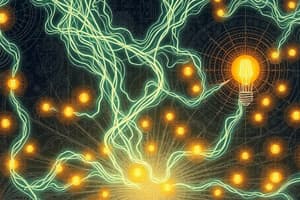Podcast
Questions and Answers
What is the power rating of the heater mentioned in the energy input section?
What is the power rating of the heater mentioned in the energy input section?
- 1000 Watts
- 157.5 Watts
- 870 Watts (correct)
- 1500 Watts
How much current does the heater draw from a 230 V supply?
How much current does the heater draw from a 230 V supply?
- 4 A
- 5 A
- 2.5 A
- 3.78 A (correct)
What is the efficiency of the pump motor in Example 1.4?
What is the efficiency of the pump motor in Example 1.4?
- 85 per cent
- 80 per cent (correct)
- 75 per cent
- 90 per cent
What is the calculated input power of the pump motor if it functions at an efficiency of 80 per cent?
What is the calculated input power of the pump motor if it functions at an efficiency of 80 per cent?
How much energy do 4 tube lights of 40 watts consume if they work for 5 hours a day?
How much energy do 4 tube lights of 40 watts consume if they work for 5 hours a day?
What is the formula for electrical energy in terms of voltage and charge?
What is the formula for electrical energy in terms of voltage and charge?
If electrical power is given in kilowatts and time in hours, how is electrical energy calculated?
If electrical power is given in kilowatts and time in hours, how is electrical energy calculated?
How many joules are there in 1 kilowatt-hour (kWh)?
How many joules are there in 1 kilowatt-hour (kWh)?
What is the relationship between kilowatt-hours and calories?
What is the relationship between kilowatt-hours and calories?
What is the definition of one calorie in terms of water temperature?
What is the definition of one calorie in terms of water temperature?
Flashcards are hidden until you start studying
Study Notes
Electrical Energy
- Electrical energy is calculated using the formula: Electrical Energy = Applied Voltage (V) × Total Flow of Charge (Q).
- Alternately, electrical energy can be represented as Electrical Energy = Voltage × Current × Time (VIt) or Electrical Energy = I²Rt.
- Electrical power (P) is defined as the work done over time, P = VI/t.
- For energy measured in kilowatt-hours (kWh), it is equivalent to Electrical Energy (kWh) = Electrical Power (kW) × Time (hours).
- Conversion of kWh to calories: 1 kWh = 36 × 10⁵ Joules, and since 1 Calorie = 4.2 Joules, then 1 kWh ≈ 860 × 10³ Calories or 1 kWh = 860 kilocalories.
Thermal Energy
- Thermal energy in SI units is expressed in calories, where one calorie is defined as the heat required to raise 1 gram of water by 1°C.
- The specific heat of water determines the energy required for temperature changes.
Power Rating and Current Calculation
- Power rating is calculated as Power = Energy Input / Time of Operation. For a heater rated at 157.5 × 10⁴ Joules over 1800 seconds, the power is 870 Watts or 0.87 kW.
- Current drawn from a 230 V supply with a power of 870 Watts: Current (I) = Power (P) / Voltage (V) = 3.78 A.
Example Problem: Water Pump Power Calculation
- A water pump lifts 64 m³ of water per minute to a height of 20 meters.
- Work done is calculated as Work = mass (m) × gravity (g) × height (h).
- For 64 m³, mass is 64 × 10³ kg, with g = 9.81 m/s², yielding a total work done of 12.55 × 10⁶ Joules per minute or 209.1 kW.
- Considering an efficiency of 80%, the input power of the pump motor is calculated to be 261.3 kW.
Residential Energy Consumption Example
- Average daily electrical consumption includes:
- 4 tube lights (40 W, 5 hours): 0.1 kWh.
- 2 filament lamps (60 W, 8 hours): 0.096 kWh.
- 1 water heater (2 kW, 1 hour): 2 kWh.
- 1 water pump (0.5 kW, 3 hours): 1.5 kWh.
- Total input energy calculation based on efficiency gives an output of 0.1627 kWh for the kettle, leading to a power rating of 1.74 kW.
Resistance Calculation for Electrical Devices
- For a 60 W lamp on a 230 V supply, resistance (R) is calculated as:
- Resistance (R) = V² / W = 230² / 60 ≈ 881.6 Ohms.
- The initial resistance at room temperature (25°C) can be deduced using the temperature coefficient of resistance, which is 0.005 per degree C.
Overview of Electrical Engineering
- Electrical engineering encompasses generation, transmission, distribution, and utilization of electrical energy.
- Electronic engineering is a sub-field focused on electronic devices and systems, including computers and digital communication.
- Understanding the basic concepts of electricity and magnetism is essential for advancements in these engineering fields.
Studying That Suits You
Use AI to generate personalized quizzes and flashcards to suit your learning preferences.




